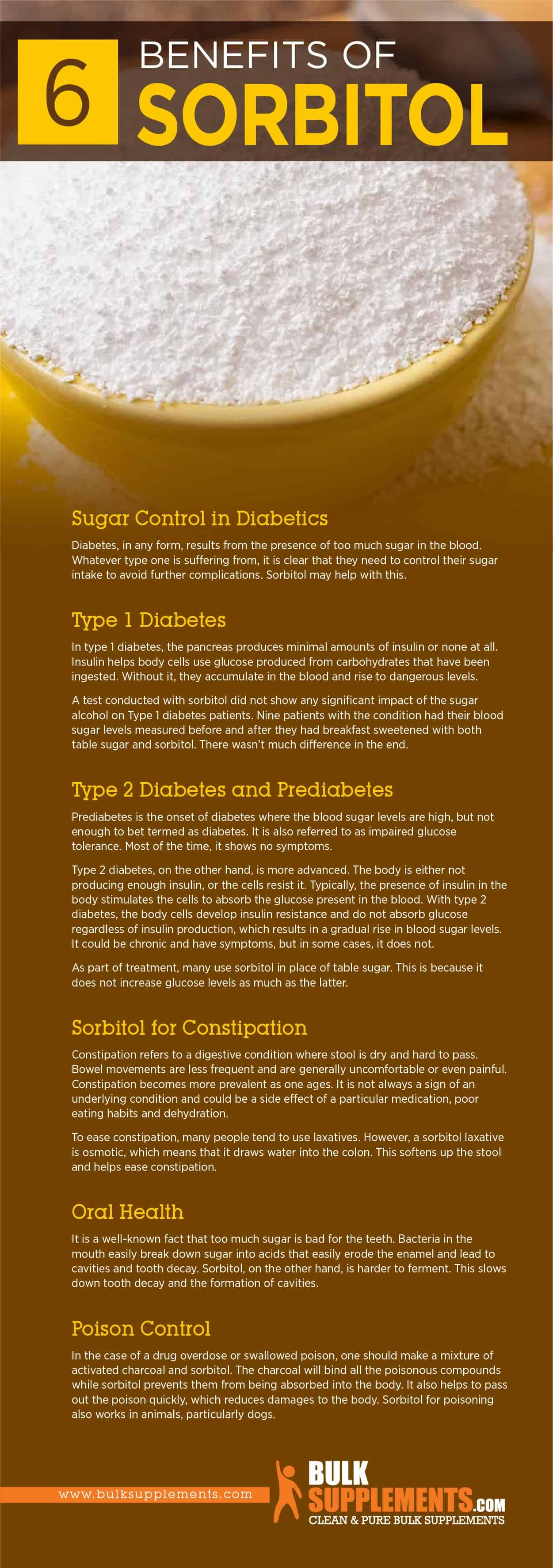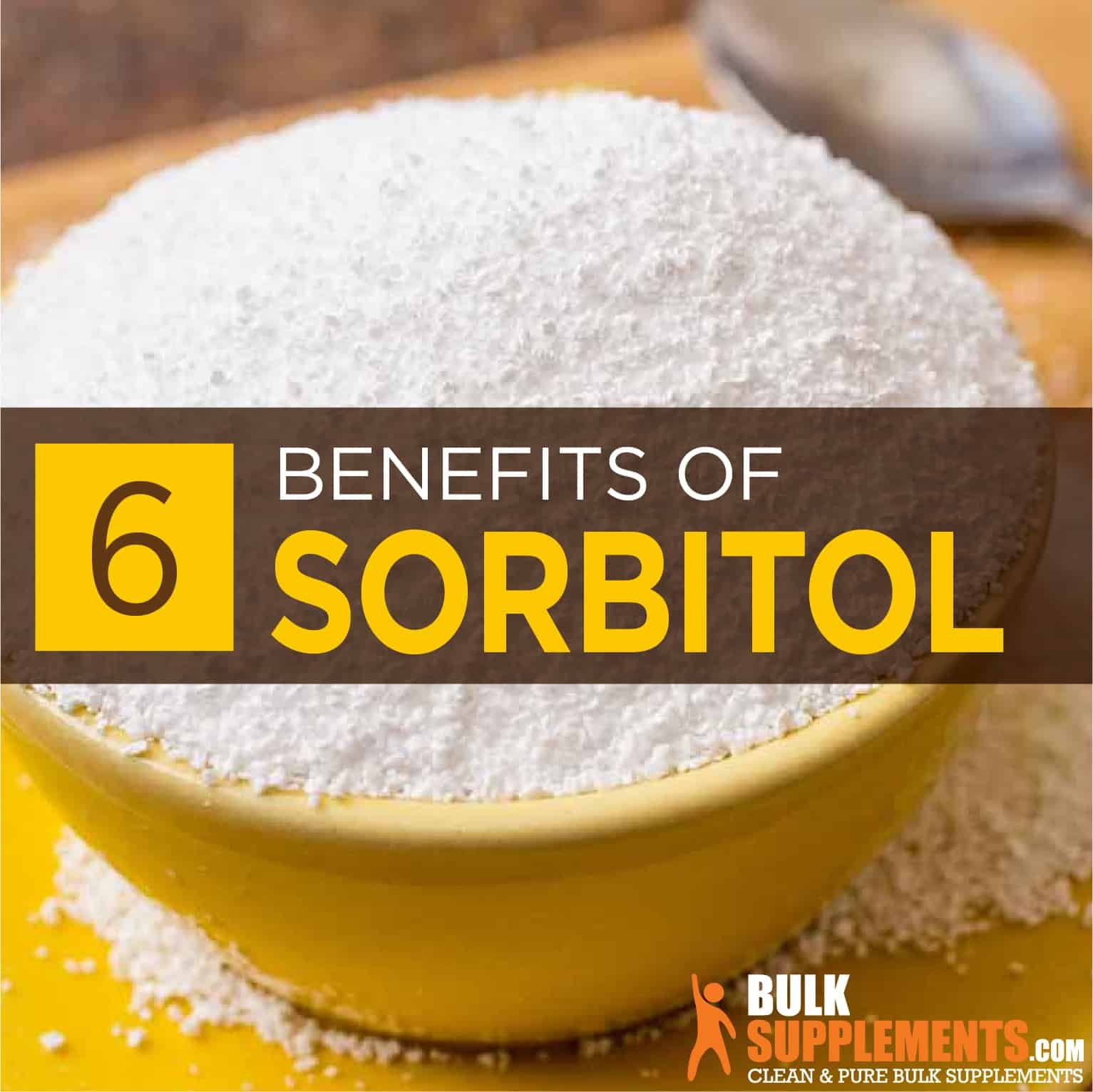What is sorbitol? Sorbitol, commonly used as an alternative sweetener, is a natural sugar alcohol in various fruits and vegetables, including apples, blackberries and apricots. Sorbitol, like other sugar alcohols, does not contain methanol. Sugar alcohols look and taste like sugar but they contain fewer calories, which may make them a healthy alternative to traditional sweeteners. Research suggests sugar alcohols may potentially benefit various aspects of health including (x):
- Blood sugar
- Digestion
- Skin care
- Oral health
Have you been looking for a healthier way to help add flavor to foods and drinks without the negative effects of sugar? Sorbitol may be the right supplement for you. However, there is no evidence that suggests sorbitol can completely cure, treat or prevent any disease or illness.
What is Sorbitol?
Sorbitol is mostly made from corn syrup. It is 60% sweeter than sugar, but only contains about 60-66% of the calories (x). Sorbitol is present in various fruits and vegetables. You can also find sorbitol in raspberries, avocadoes, peaches, plums and cherries.
Once you ingest sorbitol, it produces an enzyme called sorbitol dehydrogenase. The enzyme then breaks sorbitol into fructose, the simple sugar in fruits and vegetables. That sugar stimulates the liver to produce chemicals that can break it down further into glucose, glycogen, lactate and carbon dioxide (x, x).
When the body produces glucose—which is considered one of the simplest forms of sugar—it breaks down in the body to produce energy. Sorbitol and other sugar alcohols are a class of polyols, which are also sugar alcohols. They make up an element of the diet low in fermentable oligosaccharides, disaccharides, monosaccharides and polyols.
What is Sorbitol Made from?
Sorbitol is mostly made from corn syrup, but it can also come from apples, pears, peaches and prunes. It is created through a pressurized process that breaks down these sugars and fruits. While sorbitol occurs naturally, it can also be created synthetically from glucose (x).
Other types of sugar alcohol include (x):
- Maltitol syrup
- Hydrogenated glucose syrup
- Polyglycitol
- Polyglycitol or HSH
- Isomalt
- Lactitol
- Maltitol
- Mannitol
- Xylitol
Click here to purchase sorbitol powder now

What is Sorbitol Used for?
But how does sorbitol work? And why is it so popular?
We reached out to Hayley Cimring, BSc (Honours Dietetics) for insight on sorbitol and its effects. Cimring is a registered dietician and nutrition specialist. She writes and researches science-based articles and currently creates and reviews articles for Fitness Savvy.
Cimring states, “Excessive amounts of added sugar can have harmful effects on your metabolism and overall health. For this reason, many people turn to other sweeteners like sugar alcohols and non-nutritive sweeteners.” She also claims that the body does not completely absorb sugar alcohols from the small intestine into the bloodstream like regular sugar. Sorbitol in particular may be effective for:
- Skin care
- Oral health
- Diabetes
- Digestion
However, it is not intended to treat or prevent any medical condition or illness. Always consult a doctor before trying sorbitol or any other supplement.
Blood Sugar Control & Diabetes
Diabetes is a condition in which the body’s blood glucose, or blood sugar, is too high. There are two different types of diabetes: type I and type II. How exactly does sorbitol affect blood sugar? Actually it has less of an effect than regular sugar. According to Cimring, sugar alcohols are “popular sweeteners among diabetics and people on low-carb diets” because the body does not completely absorb them into the bloodstream.
Sorbitol may help manage blood sugar levels and prevent spikes and it may aid in insulin response. There are no studies that prove sorbitol has significant effects on type I diabetes, but studies have suggested that it may have a significant effect on type II diabetes. In type II diabetes, the body develops a resistance to insulin and doesn’t absorb the glucose molecules it needs, resulting in a slow increase in blood sugar.
Researchers conducted a study on diabetic rats to evaluate sorbitol’s effect on glucose. They noted that it may have increased glucose absorption in the gut and the muscles without the presence of insulin. The study suggests that it may increase glucose absorption and reduce blood sugar levels in diabetic patients (x). Sorbitol may be a significantly safer alternative to sugar.
Constipation & Digestive Health
Studies also suggest that sorbitol may be a significant aid in alleviating constipation and loosening stool. It participates in osmosis, so it draws water to the large intestine and colon and may help ease stool and promote bowel movements (x, x). However, you should consult a doctor before using it as a way to relieve constipation because too much of the supplement may loosen the stool too much and cause diarrhea.
Hydration & Aging in Skin Care
Sorbitol is a humectant, which is a substance that helps absorb and retain moisture in the body. For example, various creams and lotions for the body may contain sorbitol. This may also help with aging. As the body ages, so does the skin. It loses hydration with age and sorbitol in skin care products may reduce the signs of aging by providing moisture to the skin. It is one of several humectants, including honey, glycerin, panthenol, urea, gelatin, hyaluronic acid, alpha hydroxy acids (glycolic acid, lactic acid, sodium pyrrolidine, carboxylic acid), propylene glycol and butylene glycol (x).
Oral Health & Preventing Tooth Decay
Sorbitol may also be a safer alternative for the teeth than sugar. Just the digestive system does not break it down, bacteria in the mouth cannot break it down either, which may help prevent tooth decay and other dental issues. Usually, the bacteria in plaque metabolize the sugar in the body and release acid that then breaks down enamel, gradually reducing the strength of teeth. But since bacteria cannot break down sorbitol and other sugar alcohols, it may slow down tooth decay and help prevent the formation of cavities (x). There are many types of gum and toothpaste products that contain it.
What Are the Side Effects of Sorbitol?
Taking sorbitol may cause side effects, but most of them occur if you exceed the recommended dosage. Hayley Cimring also points out that “like many other incompletely indigestible substances, sorbitol… can ferment in the intestines,” potentially causing gas or diarrhea in excessive amounts.
Other possible side effects of sorbitol include (x, x, x, x):
Warnings & Precautions
Pregnancy & Breastfeeding
If you are pregnant or breastfeeding you should not take sorbitol. Researchers performed an experiment on a lactating rat and noticed that alcohol passed to its offspring through its breastmilk, causing symptoms of toxicity. The offspring were underdeveloped with possible damage to their livers and bone marrow (x). There is limited research on human subjects, but it may be best to stay away from it to be safe.
Sorbitol Intolerance
You may also want to test for sorbitol intolerance before taking the powder supplement. In a study, 32% of participants experienced symptoms of intolerance after they took it (x). Excessive amounts of it may also cause irritable bowel syndrome (IBS) or worsen its effects for those who already have it.
Why Try Sorbitol?
If you’ve been looking for a healthy way to support blood sugar, digestion, dental health and hydration, sorbitol may be the right supplement for you. There are several potential health benefits of it, all of which may result in a healthy overall lifestyle. It is increasingly popular for patients with diabetes or people who follow low-carb diets because it typically does not interfere with blood sugar and is low in calories.
However, be sure to consult a doctor before taking it to make sure the supplement is the right one for you. Different patients may react differently to it. Although it may provide health benefits, it may not be the right supplement for everyone.
How to Take Sorbitol
As a sweetener, use pure sorbitol powder just as you would use regular table sugar. You can mix it into your baked goods or sprinkle it into your coffee or tea. The recommended dosage is 1 tsp (3,000 mg). If you consume more than 50 grams of ita day, it might cause a mild laxative effect. Consult a doctor before you use it.
Where to Buy Sorbitol
You can purchase sorbitol powder today at BulkSupplements.com. The company is an industry-leading manufacturer and distributor for pure dietary supplements. BulkSupplements.com is not just a consumer brand. It also supplies pure ingredients to other brands that distribute food and other supplement products. All products at BulkSupplements.com are manufactured and tested according to proper and current manufacturing practices.
Are you interested in trying sorbitol powder to possibly control blood sugar, maintain oral health, hydrate the skin and reduce signs of aging and improve digestion? Contact BulkSupplements.com to place an order today.
Bottom Line
Sorbitol is a sugar alcohol that is naturally present in fruits and vegetables, but is also processed from other sugars such as glucose. Sorbitol is considered a healthier alternative to sugar, because it contains 40% less calories than sugar but it is 60% sweeter, making it a common food additive.
People with diabetes may be able to use sorbitol instead of sugar to potentially increase glucose absorption, which may reduce blood sugar levels. Sorbitol may also help ease digestion, support hydration and maintain oral health. It may help promote health and overall wellness and if you’re looking for a way to add sweetness to your life without all of the negative health effects of sugar, sorbitol may do the trick. However, like any supplement it may cause side effects, so you should always consult a doctor before taking it.
**These statements have not been evaluated by the Food and Drug Administration. These products are not intended to diagnose, treat, cure or prevent any disease.


